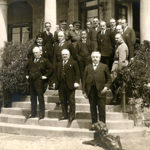Published April 12, 2008
Intercollegiate Studies Institute’s 2008 National Leadership Conference
Remarks to the Intercollegiate Studies Institute’s
2008 National Leadership Conference on
“The Free Market and the Common Good:
Wilhelm Röpke and the Future of the Humane Economy”
Indianapolis, Indiana, 12 April 2008
Having heard four presentations on the German economist-philosopher Wilhelm Röpke (1899-1966), we gather the speakers in this “capstone panel” to step back and ask, What have we learned, not only about but from Wilhelm Röpke that is worth conserving?
Our speakers have offered views from several angles. John Zmirak condensed his excellent biography [1] to depict “Wilhelm Röpke: His Life and Times.” Allan Carlson focused on “Röpke’s Conundrums over the Natural Family.” Roger Scruton broadened his advertised theme, “Röpke’s Humane Economics: Lessons for the European Union,” to the more engaging topic “The Journey Home.” Edward Hadas found Röpke more convincing as philosopher than economist, and after considering “Röpke and the Search for the Common Good” came to “a complex and mixed judgment.” As moderator but also an economist who has found Röpke’s economics valuable, I will try to place it in context of the rest of economic theory and then suggest how it may connect the philosophical themes raised by our other speakers and conference participants in response.
I agree with Edward Hadas that we need to return to basics. First, What is economics about? Jesus once empirically observed that since the days of Noah and Lot people have been doing, and until the end of the world presumably will be doing four kinds of things. He gave these examples: “planting and building,” “buying and selling,” “marrying and being given in marriage,” and “eating and drinking” (Luke 17:26-8). In other words, we humans spend our time producing, exchanging, giving, and using our human and nonhuman goods.
Scholastic economics (1250-1776) began in the mid-13th Century when Thomas Aquinas integrated these four elements (production, exchange, distribution and consumption), all drawn from Aristotle and Augustine, to outline individual, domestic and political economy within scholastic natural law–all which rested on the Two Great Commandments, to love God above all and your neighbor as yourself.[2] The scholastic outline was taught by Catholics and Protestants (after the Reformation) for more than five centuries. Classical economics (1776-1871) began when Adam Smith cut these four elements to two in trying to explain what he called “division of labor” using production and exchange alone–thus dropping the theories of distribution and consumption. Modern “neoclassical” economics (1871-c.2000) began in 1871 when three economists[3] simultaneously but independently reinvented Augustine’s theory of utility and so began reintegrating consumption with production and exchange. Thus the history of economics has had three phases so far, each with an outline differing in logical structure. In the forthcoming book[4] that Rich Brake mentioned, I argue that a fourth “neoscholastic” phase (c. 2000- ) is beginning that will revolutionize the field again, by restoring the theory of distribution. I think Röpke’s main technical contribution was to start doing so.
Röpke is best known for his political economy. As John Zmirak noted, he was among the first professors fired for denouncing Nazi policies as Hitler took power in February 1933 and forced into exile, first in Amsterdam, then Turkey and finally Switzerland. During this “most tragic phase of German history…when not a single star seemed to light over Germany,” as Ludwig Erhard would later put it, Röpke himself served as a kind of polestar by which Erhard navigated, and Röpke’s anti-Nazism gave credibility to Erhard’s 1948 simultaneous currency reform and abolition of wage and price controls (controls that occupying powers Britain and France continued to emulate at home) which triggered Germany’s postwar Wirtshaftswunder or “economic miracle.”[5]
Röpke’s critique of socialism had been inspired by Austrian economist Ludwig von Mises, as both Zmirak and Roger Scruton observed. However, as Zmirak also noted, “Röpke’s concern for preserving social values such as community, family, and tradition set him apart from strict libertarians such as Hayek and Mises–who were nevertheless close friends of his.” Röpke was not merely concerned to protect but also offered a genuine economic theory of what he called “the simplest and most genuine of communities, the Family…which derives from monogamous marriage and which is the original and imperishable basis of every higher community.”[6] Because of its inherently intergenerational nature the family is also the primary unit for preserving any tradition or culture.
It’s true that “Röpke greatly over-estimated the procreative potential of late 20th Century Western man,” as Allan Carlson points out. This is because his economic theory[7] was developed before Theodore W. Schultz reinvented Aristotle’s theory of production, coining the terms “human capital” in 1961 to describe investments in people (particularly formal education) and “nonhuman capital” for investments in property.[8] But the same is true of Mises and Hayek as well as the “Chesterbelloc (G.K. Chesterton and Hilaire Belloc, the originators of “Distributism).” All these men became financially comfortable not by investing in property according to their respective economic theories, but rather chiefly from the return on investment in their so-called human capital, particularly their education and writing skills.
Though his theory shared this shortcoming, Röpke also developed a genuine theory of distribution, which as in the scholastic outline integrated domestic with personal and political economy. In an important passage in A Humane Economy he explains, “To be in want means to be in a situation, for whatever reasons, in which we lack the means of subsistence and are unable to procure them by current earnings because we are ill or unemployed or bankrupt or too young or too old….If we think it though carefully, we live in times of need by consuming what someone else produces but does not himself consume….By what title the needy draw on the current flow of production is quite another question.”[9] With this simple device Röpke goes on simply yet comprehensively to categorize all such provision for need as either “self-providence” (e.g. saving or insurance) or “extraneous relief,” the latter being either “voluntary” (e.g. “borrow or accept charity or the help of my family or some other group”) or “compulsory”(e.g. “public old age pensions, health insurance, accident insurance, widows’ benefits, unemployment relief”); and that since these forms of individual and collective providence are substitutes for one another, the methods must be preferred in this order to avoid impairing the ability and willingness of persons, families and other human groups to fulfill their proper responsibilities.[10]
A complete “neoscholastic” economic theory must therefore combine Röpke’s theory of distribution with Schultz and Kendrick’s theory of production (along with the theories of consumption and exchange.) I’ve shown that doing so can explain why starting pay-as-you-go retirement pensions encouraged fertility, e.g. the American Baby Boom yet fertility declines if the pensions grow too large — as we see today in developed Asia and Europe. Allan and I first encountered each other while debating this point back in the 1980s. But it’s relevant for our country’s future also. I have calculated in a recent study that if legal abortion continues and U.S. social benefits double as now projected over the next 75 years, the U.S. birth rate will decline also from 2.1 to about 1.6.[11]
Roger Scruton noted that “The argument developed by Mises in his critique of socialism was, Röpke thought, demonstrative. The centrally planned eco
nomy destroyed the information on which rational economic decisions depend” (p. 1). Röpke did consider this argument demonstrative, and rightly so. But as he makes clear in A Humane Economy, Röpke also learned that this argument had originated not with Mises or Hayek but Aquinas.[12] By mentioning “the information on which rational economic decisions depend,” Roger Scruton expressed what I understand Aquinas to have meant when he wrote, “human affairs are conducted in more orderly fashion if each man is charged with taking care of some particular thing himself, whereas there would be confusion if everyone had to look after any one thing indeterminately.” In other words, all economic activity is rational; but because learning requires scarce time, every individual human must concentrate on the small part of the market of which he has most direct knowledge. Mises and Hayek seem though to make a different claim, e.g. when Hayek writes, “it is important to avoid, right from the start, a notion that stems from what I call the ‘fatal conceit’: the idea that the ability to acquire skills stems from reason. For it is the other way around: our reason is as much the result of an evolutionary selection process as is our morality.”[13] Mises and Hayek viewed man as less than fully rational, operating as Hayek put it somewhere “between reason and instinct.”
This brings me in closing to a pair of related points I think worthy of our discussion: not only the world-views implicit in economic theory, but also ideology, which in Hannah Arendt’s succinct description is not merely a term of abuse for a philosophy with which we disagree, but a “fictitious world.” Among the many virtues of Zmirak’s biography is his description of Röpke’s evolution from a Misesian libertarian to a Christian humanist after he realized in discussion with his fellow exile in Turkey, Alexander Rüstow that the world-views implied in scholastic, classical, and neoclassical economic theory are not only different but incompatible.
When Paul preached in the marketplace of Athens (probably in 51 A.D.), he prefaced the Gospel with a Biblically orthodox version of natural law that he adapted from Greco-Roman philosophy. The evangelist Luke tells us that “some Epicurean and Stoic philosophers argued with him” (Acts 17:18). The same dispute continues among (neo)scholastic, classical and neoclassical economists. In the scholastic natural law, economics is a theory of rational providence, describing how we “rational,” “matrimonial” and “political animals” choose both persons as “ends” (expressed by our personal and collective gifts) and the scarce means to be used (consumed) by or for those persons, made real through production and exchange.
I suggest that by dropping the scholastic economic theories of distribution and consumption that he had learned, Smith expressed the Stoic pantheism that viewed the universe “to be itself a Divinity, an Animal”[14] with God as its immanent soul, so that sentimental humans choose neither ends nor means rationally. By restoring consumption but not distribution, neoclassical economics expressed the Epicurean materialism that claims humans somehow evolved in an uncreated universe as semi-rational or clever animals, highly adept at calculating means but having no choice but self-gratification since (in Hume’s words) “reason is, and ought only to be, the slave of the passions.”[15] Or as Mises put it, “The power to choose whether my actions and conduct shall serve myself or my fellow beings is not given to me.”[16]
Röpke thought that it is. He understood like the scholastics that our most fundamental scale of preferences is for persons, not things, and that someone who loves only himself (as classical and neoclassical theory presumes) he is not fully human. Perhaps not least among the lessons we can learn from Wilhelm Röpke, therefore, is how to proceed when our usual allies are mistaken. Röpke seems to exemplify Abraham Lincoln’s advice when trying to end American slavery without violating the Constitution that permitted it: “Stand with anybody that stands right. Stand with him while he is right and part with him when he goes wrong.”[17] Despite admitted shortcomings, this seems to characterize Wilhelm Röpke’s effort to construct a humane economics–and our task also if we seek to conserve what deserves conserving.
1 Wilhelm Röpke: Swiss Localist, Global Economist, ISI Books, 2001.
2 Deut. 6:5, Lev. 19:18; cf. Mt. 22:37-40.
3 W.S. Jevons in England, Carl Menger in Austria, and Leon Walras in Switzerland.
4 John D. Mueller, Redeeming Economics: Free Markets and the Human Person, ISI Books, Wilmington, DE, 2008.
5 Jacques Rueff played a role in France similar to Erhard and Röpke’s in Germany, though his reforms were implemented ten years later.
6 Wilhelm Röpke, The Moral Foundations of Civil Society, Transaction Publishers, New Brunswick, NJ, 1996)]; 133 [1st ed. William Hodge & Co, 1948].
7 In his extremely readable economics textbook, Röpke had said that when population increases in proportion to population, labor productivity and the standard of living remain unchanged “if we ignore certain incidental influences on production, such as inventions, etc.” Wilhelm Röpke, Economics of the Free Society, Henry Regnery, 9th ed., 1963; 59 (1st ed. Die Lehre von der Wirtschaft, Julius Springer, Vienna, 1937). But in the total capital hypothesis, the research that produces such inventions is not incidental but rather the main factor raising living standards over long periods.
8 Theodore W. Schultz, “Investment in Human Capital,” American Economic Review Vol. LI No. 1, March 1961, 1-17, 6. John W. Kendrick later generalized Schultz’s insight into the “total capital hypothesis,” which comprehensively describes investments in human and nonhuman capital, both tangible and intangible, and showed that it is empirically true. John W. Kendrick, The Formation and Stocks of Total Capital, National Bureau of Economic Research and Columbia University Press, New York, 1976; “Total Capital and Economic Growth,” Atlantic Economic Journal, Vol. 22, No. 1 (March 1994), 1-18.
9 Wilhelm Röpke, A Humane Economy: The Social Framework of the Free Market, Gateway Editions, South Bend, IN, 1960, 173.
10 Ibid, 174-175.
11 John D. Mueller, “How Does Fiscal Policy Affect the American Worker?” Notre Dame Journal of Law, Ethics and Public Policy Vol. 20 No. 2 (Spring 2006), 563-619; available at http://www.eppc-stage.local/publications/pubID.2671/pub_detail.asp.
12 Ibid, 278 n. 16. Aristotle had given two arguments for private over common ownership of property, social peace and productivity: “If the responsibility for looking after property is distributed over many individuals, this will not lead to mutual recriminations; on the contrary, with every man busy with his own, there will be increased production all round,” Aristotle’s
Politics II, 5, T.A. Sinclair, ed., Penguin Books, 1962; 63. Aquinas added a third, greater order resulting from the efficient use of specialized knowledge: peace (“a more peaceful state is ensured to man if each one is contented with his own”); productivity (“every man is more careful to procure what is for himself alone than that which is common to many or all”); order (“human affairs are conducted in more orderly fashion if each man is charged with taking care of some particular thing himself, whereas there would be confusion if everyone had to look after any one thing indeterminately”), Summa theologiae II-II Q66 A2
13 F.A. Hayek, The Fatal Conceit: The Errors of Socialism, ed. W.W. Bartley III, 1Collected Works, University of Chicago Press, 1989, 21.
14 Adam Smith [1795], “Essays on Philosophical Subjects,” in The Early Writings of Adam Smith, ed. J. Ralph Lindgren, Augustus M. Kelley, New York, 1967.
15 David Hume, A Treatise of Human Nature, II, III, iii, http://www.gutenberg.org/dirs/etext03/trthn10.txt.
16 Ludwig von Mises, Socialism IV.27.7, op. cit, available at http://www.econlib.org/library/Mises/msS10.html#Part IVCh.29, last accessed 11 March 2008.
17 Abraham Lincoln, Speech at Peoria, Illinois, October 16, 1854. 2 The Collected Works of Abraham Lincoln 275, ed. Roy P. Basler et al (New Brunswick, NJ, 1953), available at http://www.nps.gov/liho/historyculture/peoriaspeech.htm.









